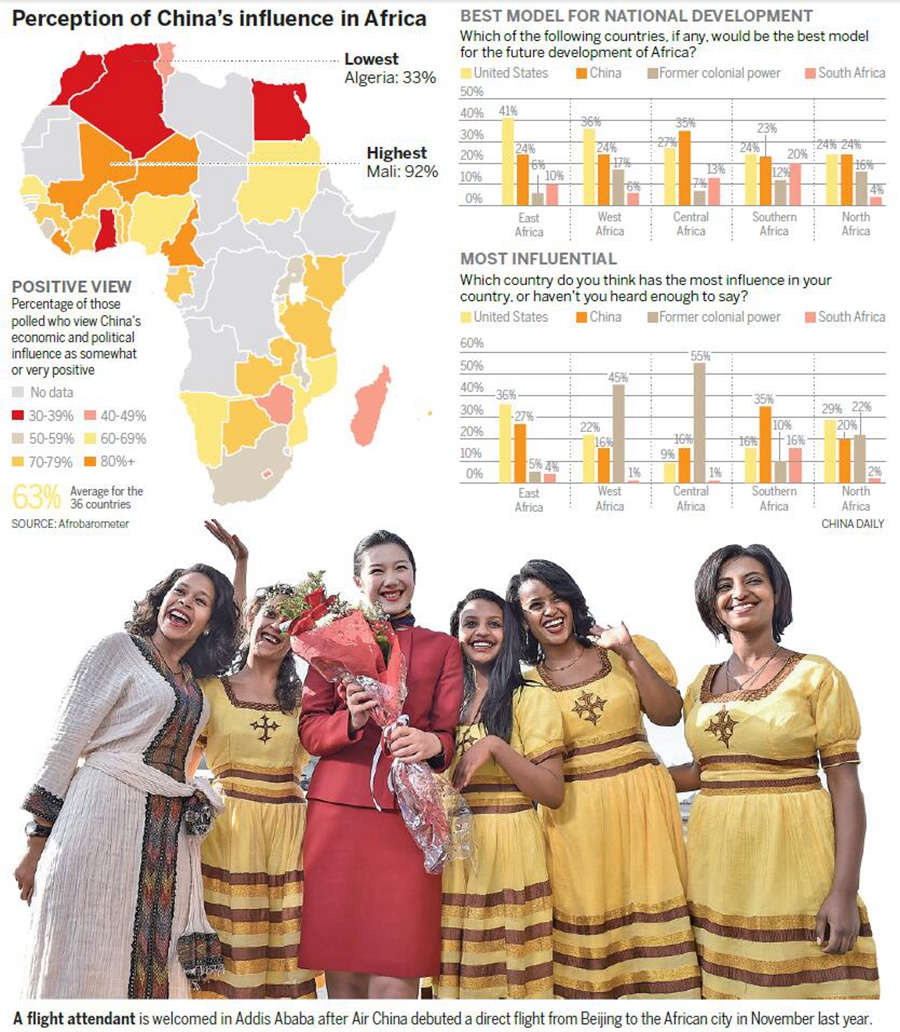Driving along the street in Addis Ababa, capital of Ethiopia, Marakeegn Bengi was impressed with the Chinese presence in Africa, in particular regarding infrastructure.
“The two light railways in the city are built by the Chinese, and a third one is being planned,” said the employee of Taycon Real Estate.
Others are impressed as well. Two surveys indicated that Africans’ view is positive toward the increasing Chinese engagements on the continent.
According to surveys conducted in 2014 and last year in 36 African countries by Afrobarometer, a Pan-African, nonpartisan research network, the public largely holds favorable views of economic activities and assistance by China.
An average of 63 percent said China’s influence in Africa is “somewhat”, or “very” positive.
Afrobarometer interviewed about 54,000 people in the surveys.
Overall, Africans ranked the United States and China No 1 and No 2, respectively, as development models to follow, although the ranking varied by region.
The respondents not only affirmed the important economic and political role that China plays in Africa, but also generally saw its influence as beneficial, the report said.
Among the ways that China has increased ties to the continent is the Forum on China-Africa Cooperation, initiated in 2000. Ministers gather every three years for the forum, which is the primary vehicle for China’s strategic engagement with sub-Saharan Africa.
“FOCAC ... is also successfully changing Africa’s perception toward the second-largest economy in the world,” said Symerre Grey-Johnson, head of regional integration and trade division at the New Partnership for Africa’s Development.
“There is a solid political impetus by China to invest in Africa. The underlining strategy is to develop as mutual friends. Hence, this engagement has taken a friendship approach, which has struck an affinity chord with many African governments,” Grey-Johnson said from South Africa.
China’s infrastructure development and business investment are major reasons behind China’s positive image in Africa, although that image is tainted by perceptions of poor-quality Chinese products, according to the report.
In the second poll, the Policy Monitoring and Research Center, a think tank in Zambia, conducted interviews about the ways Chinese nationals in the African country are integrated into local society, and how they contribute to socio-economic development there.
According to the results, 63 percent of Zambians interviewed said they had benefited from the Chinese through job creation and income, while 26 percent said infrastructure had improved due to the presence of Chinese in the community.
Additionally, 77 percent of Zambian respondents said their communities were in some way affected by Chinese work ethics such as professionalism, commitment and efficiency.
Wilson Muna, director of research and coordinator for the Tafiti Center at the Africa Policy Institute, a Kenyan policy research company, said the Chinese companies’ openness in sharing their knowledge “is an invaluable asset for Africa, as it facilitates knowledge and technological transfer”.
Sino-African trade has increased from $10 billion in 2000 to nearly $300 billion last year.
More than 1 million Chinese, most of them laborers and traders, have worked in Africa over the past decade.
“The $60 billion in assistance offered by President Xi Jinping during the FOCAC summit in Johannesburg, South Africa, in December was a strong testament that China sees Africa as a market full of potential,” Muna said.

